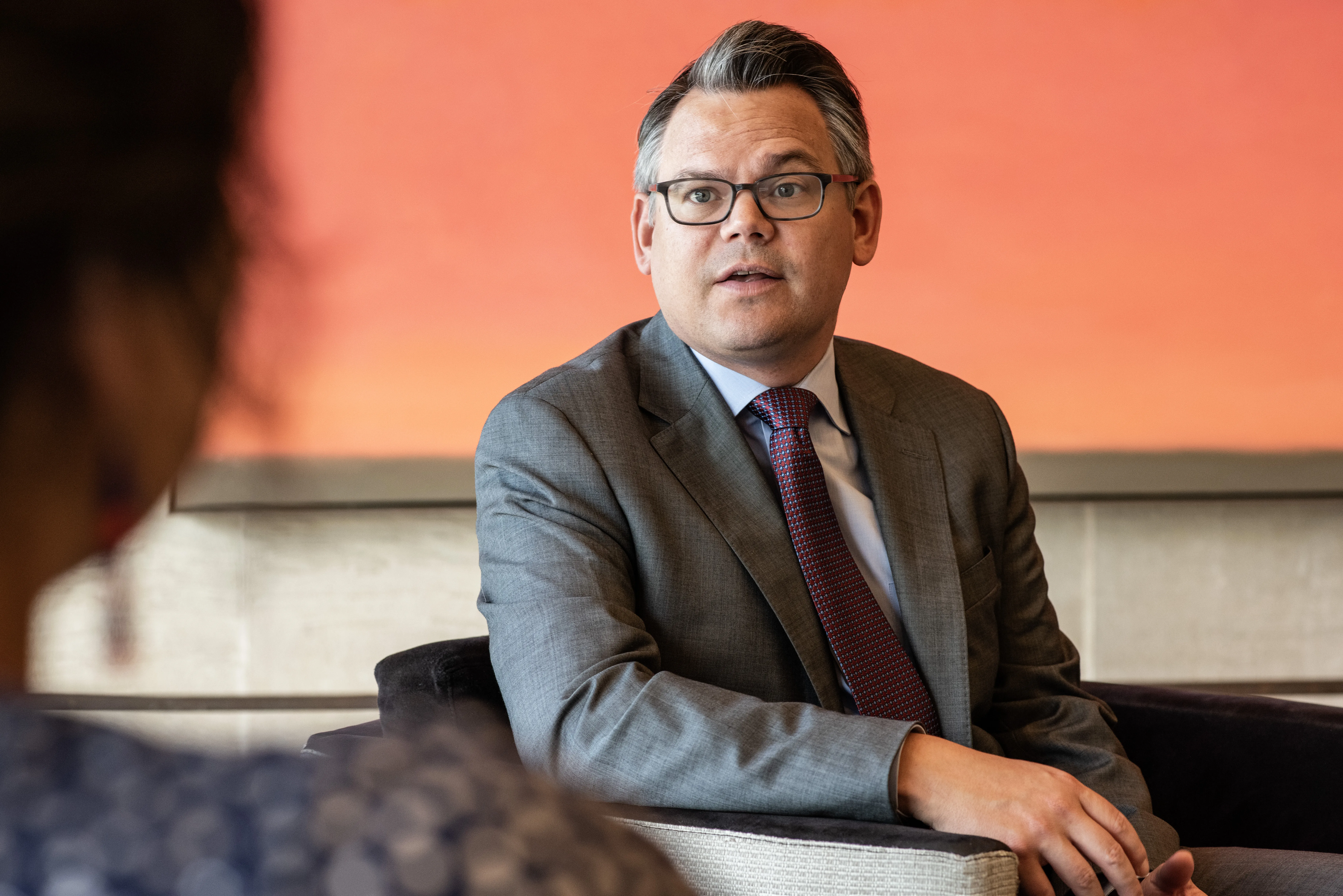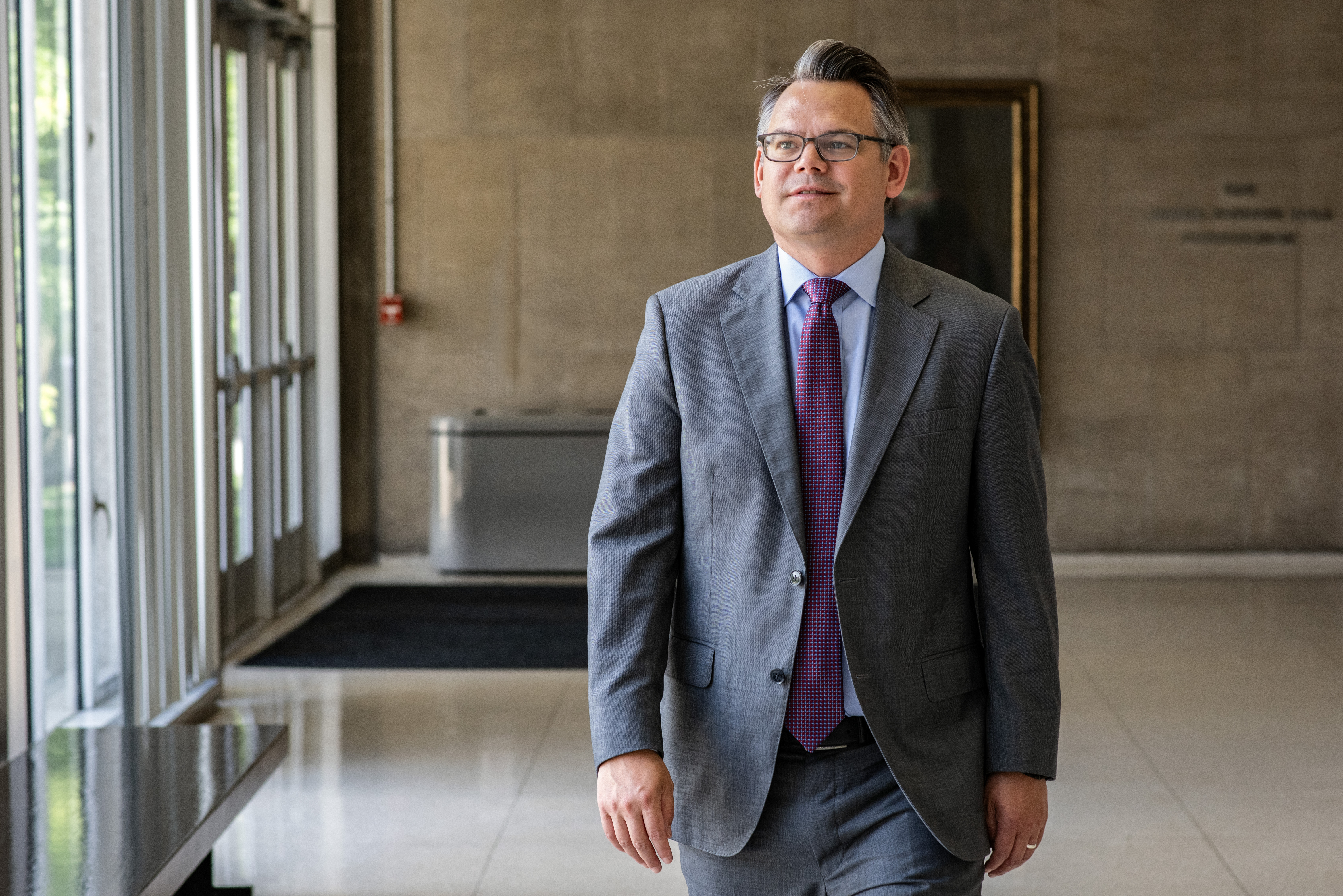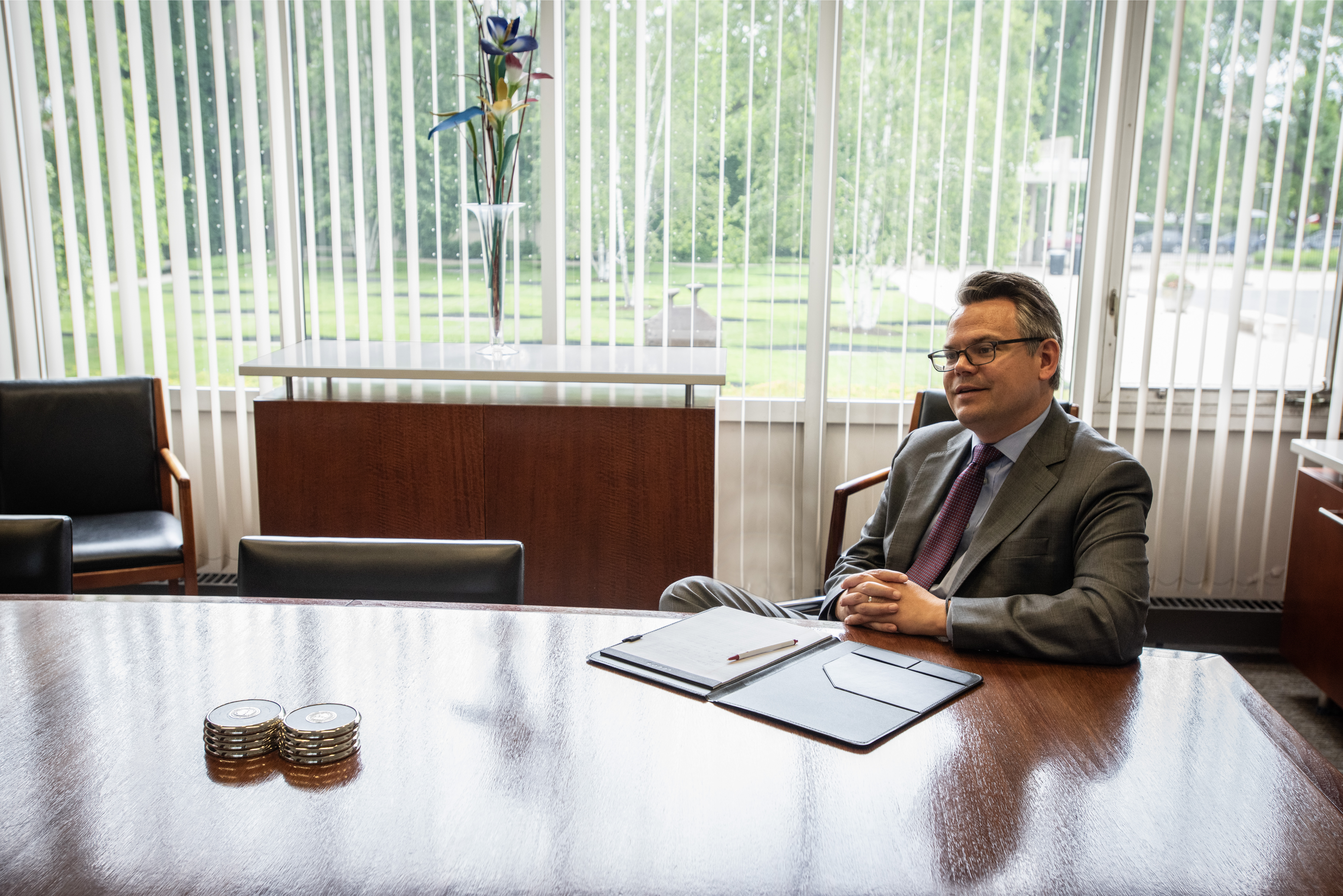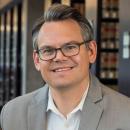Preserving Our Culture and Adapting to Change: A Conversation with New Dean Adam Chilton

Adam Chilton, the Howard G. Krane Professor of Law and the Walter Mander Research Scholar, took the reins of the Law School as its 15th dean on July 1. (Former Dean Thomas J. Miles, the Clifton R. Musser Professor of Law and Economics, returned to the faculty after a decade of decanal service.)
Chilton began his journey at the Law School in 2013 as a Bigelow Fellow and subsequently joined the faculty full-time a year later. A prolific scholar with a wide-ranging reach, Chilton’s primary research interest is in empirical law and economics, with a particular focus on comparative law, international law, and studying the legal profession. He says he plans to continue his research endeavors as dean, though on a smaller scale in lieu of his new responsibilities.
We recently sat down with Dean Chilton to discuss his vision for the Law School, his views on legal education today, and his scholarly path.
Congratulations on becoming dean of the Law School! How are you feeling as you step into this new role?
I'm feeling incredibly excited and extremely lucky. I think that our Law School is not only already the best in the world, but that we are also very well positioned for the current moment in higher education and legal practice. So, to be able to lead the Law School into its next chapter when we're already in such a strong position is a fantastic opportunity.
What excites you most about the months ahead?
I've been at the Law School for a while, but as a professor, you mostly interact with the other faculty and with the students. But the Law School is a much larger community situated within an even bigger university. I'm excited to engage more with the other people—the staff, the alumni, and other people across the University—who make the Law School fantastic.
You’ve been on the faculty for more than a decade now. What has kept you here?
Many university departments are sleepy places where the faculty mostly work from home, come in to teach their classes, and then leave for the day. Same with students. They come in to take their classes then leave. The Law School is very different in that both the faculty and students are very present and deeply engaged with one another. They are physically in the building working, they eat lunch together, they attend workshops together, and they take advantage of different ways of connecting outside the classroom. This element of our culture makes UChicago Law an extremely stimulating place to work. It’s that vibrant culture that made me fall in love with the place and that has kept me here.
What do you hope to accomplish as dean?
My goal is to preserve what’s great about the Law School during a turbulent time for higher education, while also making sure we adapt to changes in the market for legal services and legal employment.
The reason that I’m so focused on preservation is that I strongly believe that our law school has long had the right values. That includes our strong culture of teaching excellence, our commitment to producing rigorous scholarship, and our dedication to cultivating an environment that supports free inquiry, open debate, and the rigorous exchange of ideas. In addition to maintaining our commitment to these values, I also want to make sure we pass on a love of them to our students.
But, in addition to preservation, we do also have to be open to innovation. Our law school is determined to produce the world’s best lawyers. This requires ensuring that we provide students with the education that they need to be ready to incorporate new technologies and developments into their future practices.
What do you see as the biggest challenge facing legal education right now?
The market for hiring new lawyers is changing rapidly. For instance, employers are hiring students earlier and earlier through a less organized process. Additionally, the number and types of lawyers that firms plan to employ is changing too. The biggest challenge facing legal education is thus trying to find ways to train and prepare our students for the shifting landscape of legal practice.
What role do you think technology—AI in particular—should play in legal training here at the Law School?
Our first priority must be ensuring that our students continue to learn the law. That might mean altering the ways we evaluate students to make sure that they are actually learning the material and engaging with it, instead of just feeding questions into ChatGPT.
But we also want to produce lawyers who are skilled at using all available tools of legal research and analysis. Those tools already include generative AI. Which is why we're making changes at the Law School to embrace AI and do everything we can to get ahead of the curve. We’re incorporating AI into our legal research and writing curriculum. We're adding new upper-level classes on the topic every year. And we're forming collaborations across the University so that we're bringing new insights from computer science, data science, and the social sciences to our students.
Are there particular areas of law or interdisciplinary work you hope to expand or emphasize over the next few years?
The Law School has a history of being at the cutting edge of interdisciplinary scholarship. We’ve played a particularly important role in the development of law and economics, but we also have a strong presence in a range of other interdisciplinary fields, including law and philosophy and law and history. I plan to continue supporting our excellence in these areas of historic strength.
But we should also be open to building new areas of strength. My view is that, when deciding which areas to prioritize, we should focus on fields that meet three criteria: they are of deep substantive importance, we have the potential to be a world leader in them, and we can offer a distinctive approach to tackling them.
There are several areas that meet those criteria, but I’ll mention two of them. The first is law and technology. Many legal scholars interested in tech have embraced something like the precautionary principle, where the focus is trying to avoid all the potential risks of new technologies. But, in our workshops and classrooms, the way our faculty talk about topics like big data and generative AI is different. People are more optimistic about the potential of technology to improve the world than pessimistic about the possible threats it may pose. I think the legal world could use a little more of that kind of UChicago thinking.
The second is the intersection of climate change and economic growth. In too many academic environments, scholars are either focused on trying to reduce carbon emissions or on encouraging economic growth. But obviously a fundamental challenge of this century will be producing enough energy to fuel our economy while still protecting the environment. The University of Chicago has launched a major new initiative that is trying to tackle these problems in a unified way. Our faculty is already playing an important role designing the curriculum and shaping the research of this new program, but it’s a space where we have even more to offer.
Your background is in law and economics and in fact, before you became dean, you were an editor of the Law School’s Journal of Law and Economics. Can you tell us what drew you to this field that is very UChicago?
Since I was a kid, I’ve loved discussing two topics: public policy and sports. By high school, I realized that data and statistics are helpful when making arguments about sports. But it took me until college to realize that data and statistics can be extremely useful when debating law and policy too. That’s what made me interested in getting into law and economics.
Within law and economics, my specific field is empirical law and economics. This field is about using data and statistical methods to study why laws are adopted and their subsequent impact. So, really, the thing that got me into law and economics was the thought that, when debating the effectiveness of law and policy, arguments are a lot more persuasive when they are backed up by data.
What kind of research are you working on right now?
I have many ongoing projects with a number of great (and, hopefully, understanding) collaborators, but I’ll mention two lines of research that I’m particularly focused on.
One is a book I’m writing with Mila Versteeg on why constitutions fail. It’s sort of a follow-up to a book we wrote on the effectiveness of constitutional rights around the world. The book we’re working on now is about countries drafting and adopting new constitutions. Chile is one recent high-profile example. Unfortunately, though, like the Chilean process, far too often new constitutions fail to be adopted or fail to address a country’s problems. We are trying to understand why that happens.
The other line of research is about the regulation of the legal profession. Along with Kyle Rozema and other collaborators, I have a series of projects focused on the rules that shape who can practice law and how they can practice it. I hope that my new role can give me additional insight into the institutions—and the motivations behind the rules—that govern the practice of law.
How do you see your scholarly work influencing your approach as dean?
As part of studying the regulation of the legal profession, I’ve researched legal education. For instance, I've written papers on law school grading systems, on tenure practices for academic faculty, and the law review publishing process. Those are all areas where my research has influenced my views.
More generally though, I think it is possible to make better decisions about legal education—like about how to structure curriculums or institute grading policies—when it’s done in a data informed way.
As dean, I hope to use our data to ensure that we're making the best possible decisions about things like how to design our final exams or hiring processes.
Will you continue to teach as dean?
I absolutely love teaching. I particularly enjoy teaching torts to our incoming 1L students. But, at least for now, I’m stepping away from teaching to focus on the deanship. I definitely don’t want to lose a connection to the students, though, so I’m going to teach in the Pre-Orientation Program and find other ways to engage with them moving forward.
What’s one thing you hope every student leaves UChicago Law having learned or experienced?
I hope that every student has the experience of having views that they hold—maybe even strongly hold—challenged by powerful opposing arguments. And, through the process of debating and considering opposing arguments, be forced to rethink, to question, and even to change some of their opinions. That process is a core part of the University of Chicago Law School experience.
At the very least, I hope students learn to understand that when they are exposed to some of the smartest legal minds in the country expressing views that are different from their own, they will often need to sharpen their arguments or understand the limits of their claims.
On a more personal note, what do you enjoy doing in your free time?
I’m a huge music fan. Starting in junior high, I would go to as many rock concerts as I could. My brother stayed in that world and became a concert promoter and venue owner. And, to brag, last year Billboard named his bar the best small music venue in the world. Which is a pretty wild accomplishment for a punk rock bar located in Phoenix, Arizona. So, although I don’t get to go to as many shows as I’d like to these days, my wife and I both love live music, and we try to attend plenty of concerts and music festivals each year.
Do you play an instrument?
No—I have no talent at all. I can’t play any instruments, and I can’t sing. But that hasn’t deterred me from loving music. I typically have music playing from the moment I wake up until when I fall asleep. At times, that’s been a challenge of having an office located in a library at a place where open doors are encouraged. So that’s one upside of moving to the dean’s suite: My music will annoy fewer students trying to study.


